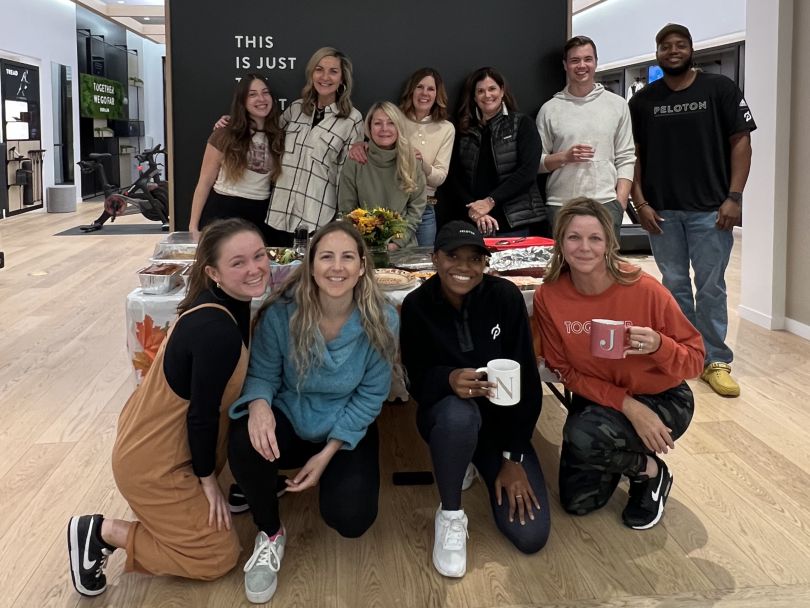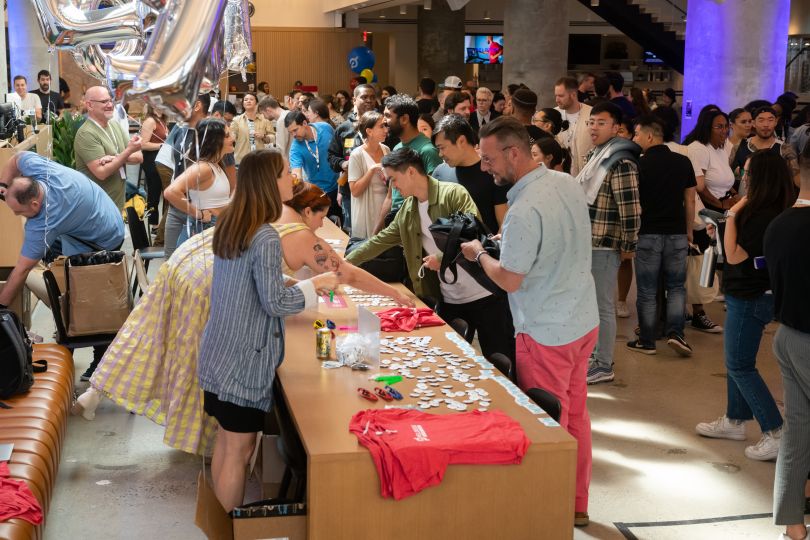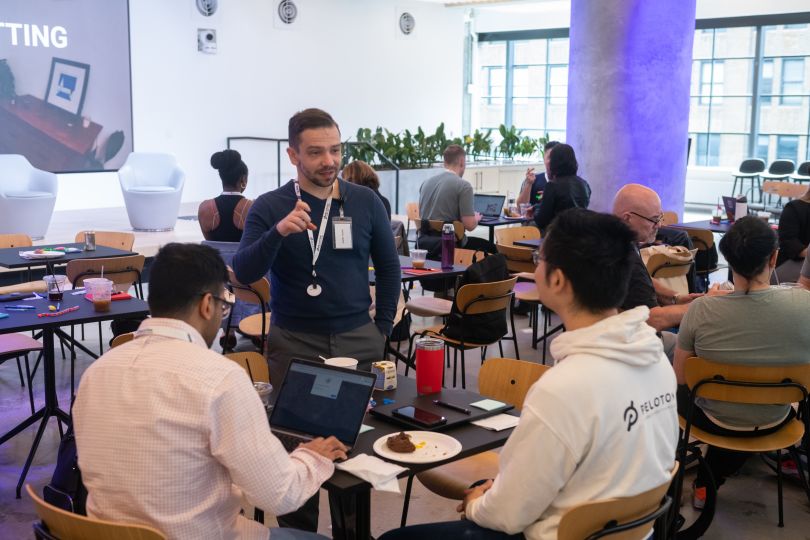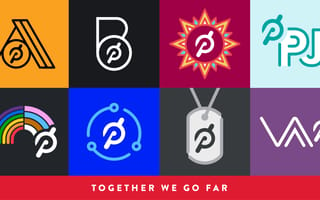Walk into one of Peloton’s offices or showrooms, and there’s a good chance any team member you encounter is part of an employee resource group.
How good are the odds?
Better than 40 percent, according to Matthieu Garcia, DEI senior manager at Peloton. In the broader context of the American workforce, just 8 percent of employees participate in ERGs — despite ERG presence in 90 percent of Fortune 500 companies, found researchers from Bentley University.
Team members are rushing to join Peloton’s ERGs in large part because they’re succeeding at their most essential function: fostering community and building belonging.
That’s the feeling Kiefier Hunter, a commercial support associate, gets from being a part of Thrive, an ERG that advocates for mental health, neurodiversity and differing abilities.
“Thrive brings people from diverse walks of life together, creating micro-communities within the larger corporate structure,” said Hunter. “We are able to talk about similar experiences within our roles and also the day-to-day obstacles involving neurodiversity.”
At Peloton, community-building reaches far beyond the internal team to its members, said Supervising Producer Molly Ward.
“I think our members can tell when we’re being authentic — it’s part of what makes our content and products so competitive,” said Ward. “We’re ready to meet our members wherever they are and bring them into the fold.”
It’s the company’s internal ERG efforts that serve as the cornerstone of its authentic content.
“If we didn’t have the internal DEI work or the ERGs helping create the culture, we couldn’t extend into our classes and then to our members the way we do,” said Ward. “Taking that one Pride or Black History Month class where you feel uniquely seen and celebrated can make someone a fan for life.”

Getting Everyone Involved
Peloton’s success with ERGs can be traced back to its DEI strategy. Instead of making DEI the responsibility of a single department, Garcia said his team frames it as a collective effort.
“At Peloton, DEI is the role and responsibility of every team member,” said Garcia. “It is integrated into all parts of the business and has become an active role for everyone.”
Participating in an ERG provides a direct way for team members to help drive Peloton’s DEI mission and vision of cultivating a culture of inclusion and connection. In addition to joining as a member, anyone has the opportunity to start a new group. While ideas come from individuals, Garcia noted that the DEI team offers support throughout the process.
This includes establishing the group’s mission and vision and building a business case for it, of which Hunter has direct knowledge through his work with Thrive.
“We secured funding by showcasing the ERG’s return on investment and gained leadership support through educational workshops,” said Hunter.
Along with group funding, leads are compensated for their time and given additional career development and learning opportunities. Black@Peloton was the first ERG founded, followed by Women’s Alliance. Today there are eight groups total — not including our Inclusion Forums, which are established in our international markets to meet the size and demand of our team members overseas.
Peloton's ERGs at a Glance
- ACE@Peloton, the Asian Community ERG, fosters the Asian-Pacific Islander community.
- Black@Peloton promotes individual and collective growth through various resources and networking opportunities.
- LHIT@Peloton aims to serve and unite Latino and Hispanic employees of all backgrounds.
- Parenthood Journey creates an open space to discuss all aspects of working parenthood.
- Pride@Peloton empowers and supports LGBTQ+ team members and allies.
- Thrive ensures individual and team mental health, neurodiversity and disability needs are met.
- Veterans@Peloton builds camaraderie between former service members and provides education on veterans affairs.
- Women’s Alliance fosters an environment where empowered women can thrive.

ERGs in Action
Through funding, compensation and guaranteed executive support, Peloton ERGs are able to expand their remit beyond creating safe spaces for team members. Professional development is a particular area of interest, with all groups offering programming to help team members grow their careers.
This includes mentorship as well as events like the ones held recently by the Women’s Alliance, where external experts led discussions on career pathing, personal branding and inclusive leadership. Events like these afford team members the space to be their authentic selves, said Ward.
“In my experience with ERGs like the Women’s Alliance, these communities offer a space where you can be a complex human at work, rather than feeling like you have to present professionally at all times,” said Ward. “We love having less structured meetings where you can vent about issues in your life or in the world, or just have a drink or a treat and catch up with people about things unrelated to the office.”
ERGs offer a space where you can be a complex human at work.”
While each of Peloton’s ERGs has unique missions, they work collectively. Garcia said a major focus is placed on intersectionality, which frequently manifests itself in joint events.
“A good percentage of all ERG programming is the result of two or more ERGs collaborating,” said Garcia. “By doing this, they offer more opportunities for their communities to connect.”
A prime example of this collaboration came during the company’s celebration of World Mental Health Day. Pride@Peloton and Veterans@Peloton hosted a joint discussion on identifying feelings and emotions, LHIT@Peloton and Thrive talked about living well with boundaries, and ACE@Peloton and the Parenthood Journey held a session on curbing burnout.
Celebrating National Working Parents Day.
The Parenthood Journey and the Women’s Alliance ERGs hosted mental wellbeing specialist, Maggie Lindley, for a team member panel focused on the rewards and challenges of being a working parent and caregiver — in honor of National Working Parents Day. Attendees heard from fellow team members about their experiences and tips for preparing for parental leave, being out of the workplace, and adapting to returning to the office.
In the years to come these sessions may be different, as Garcia made it a point to emphasize that Peloton’s ERGs are in a constant state of evolution.
“One of the best features of our ERGs is their agility,” said Garcia. “As Peloton changes, they adjust to ensure our culture is maintained, employees feel supported and the business is successful.”
Spreading the Word
ERGs are at the forefront of the employee experience at Peloton — not the fringes — and Garcia and the DEI team have a goal to expand the reach of these groups even further. This summer, the company hosted a DEI Table Fair virtually and at its New York headquarters, where employees learned about each group’s mission and met with leads.
While this event brought the message to the masses, any time someone in the office wants to learn about the impact of ERGs, they can ask one of their team members, who is likely a member of at least one group.
If that person happened to ask Hunter about the benefits of joining an ERG, they’d hear about the agency these groups provide and the feeling of belonging they create.
“ERGs give a voice to underrepresented groups, advocating for inclusivity in company policies and practices,” said Hunter. “Knowing that there’s a group that represents your interests can make you feel more at home in the workplace.”

If it’s Garcia they’re talking to, they’ll learn how being a part of these groups enables team members to see people through the lens of intersectionality.
“I now see all the different parts of a person that make them unique but also connect them to a number of communities,” said Garcia.
If that team member works in Peloton Studios alongside Ward, she’ll impress upon them how ERGs enable the company to live its values.
“ERG leaders are persistent and kind in encouraging people to get involved in making Peloton the best place to work,” said Ward.
“In the over 5 years I’ve spent at Peloton, ERGs have been a steadfast source of connection throughout good times and challenges.”







